 Petzlover
Petzlover Dandie Dinmont Terrier is originated from United Kingdom but Maltese is originated from Italy. Both Dandie Dinmont Terrier and Maltese are having almost same height. Dandie Dinmont Terrier may weigh 6 kg / 14 pounds more than Maltese. Both Dandie Dinmont Terrier and Maltese has same life span. Dandie Dinmont Terrier may have more litter size than Maltese. Both Dandie Dinmont Terrier and Maltese requires Moderate Maintenance.
Dandie Dinmont Terrier is originated from United Kingdom but Maltese is originated from Italy. Both Dandie Dinmont Terrier and Maltese are having almost same height. Dandie Dinmont Terrier may weigh 6 kg / 14 pounds more than Maltese. Both Dandie Dinmont Terrier and Maltese has same life span. Dandie Dinmont Terrier may have more litter size than Maltese. Both Dandie Dinmont Terrier and Maltese requires Moderate Maintenance.
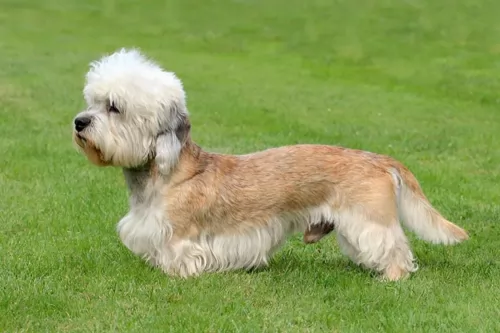 The rough coated Dandie Dinmont Terrier originates from Scotland. They were used centuries ago for hunting otters and badgers.
The rough coated Dandie Dinmont Terrier originates from Scotland. They were used centuries ago for hunting otters and badgers.
There are theories that exist that the dog is a cross between Scottish- and Skye Terriers while others believe there must be some Dachshund in the mix because of the long body of the Dandie Dinmont Terrier.
The Dandie Dinmont Terrier was first recorded as a distinct breed in the late 1600s. The British Dandie Dinmont Terrier Club was formed in 1875 while the American Kennel Club recognized the Dandie in 1886.
 The Maltese dog hardly needs any introduction as this is an ancient breed which is still as popular as ever. Some people refer to it as the "Maltese Lion Dog," or "Melita" which was Malta’s previous name.
The Maltese dog hardly needs any introduction as this is an ancient breed which is still as popular as ever. Some people refer to it as the "Maltese Lion Dog," or "Melita" which was Malta’s previous name.
It was in the 19th century, that the Kennel Club settled on the name of Maltese for the dog breed. The dog has been selectively bred to keep its small size. The exact origin of the dog is unknown and there are various stories surrounding where its origins are, thought to be Italy.
It is believed that dogs such as spaniels and poodles have been used to bring about the Maltese. The American Kennel Club, a registry for pure bred dogs, recognized the breed in 1888.
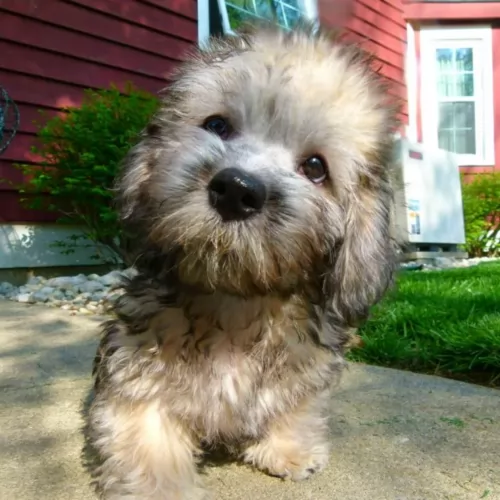 The Dandie Dinmont Terrier is a small dog who stands between 20 – 28cm at the withers and weighs between 8 and 11kg. He is recognizable by his fluffy head of hair.
The Dandie Dinmont Terrier is a small dog who stands between 20 – 28cm at the withers and weighs between 8 and 11kg. He is recognizable by his fluffy head of hair.
He actually has quite a unique look with his long body and slightly over-sized head. He has floppy ears and a long tail. His coat is quite unusual too in that it can be silky and long around the face, legs and belly, while the topcoat is fairly shortish and crisp. His coat color is fawn to brown or reddish. He isn’t a heavy shedder.
Known also as the Dandie, Charlie’s Hope Terrier, the Mustard and Pepper Terrier, the Dandie Dinmont makes an excellent family pet with his calm demeanor, being somewhat reserved around strangers.
He is an alert, intelligent little dog and will warn you of strangers coming into your space. He therefore makes a good watchdog. He is loving and loyal to his human family and will readily fit into life in the city or in the countryside.
They are good with children and pets but with his independent streak, he will require training and socialization if you want him to behave and be obedient.
 The Maltese is looked upon as a toy dog. Both male and female stand roughly between 20-25cm in height and weigh between 1 and 4kg.
The Maltese is looked upon as a toy dog. Both male and female stand roughly between 20-25cm in height and weigh between 1 and 4kg.
He is as cute as a button with a rounded skull, a pitch black nose, brown eyes and medium length floppy ears. The tail is feathery and is curled. He has a long, silky coat without an undercoat.
The color of his coat is pure white, and because he doesn’t shed he is looked upon as being hypoallergenic. Most people who own a Maltese like having the coat short to one length all round.
These little dogs have been bred to be companion dogs. They may be little, but it is a good idea to have him trained and socialized as they are inclined to be a bit snappy, especially with children.
He is intelligent, so training him won’t be difficult. Brought up the right way though, he can be good with children as well as pets in the home. They love their human families and want to be constantly with them. He is an energetic little dog too, and will just love ball games both inside and outside.
His very temperament and smallness make it that he fits perfectly into life in the city or the countryside. He is sweet and gentle but he makes a good watchdog, alerting you with his barking to strangers coming close by. Don’t leave him for long period of time as he hates being on his own and then he may start barking from sheer boredom and frustration.
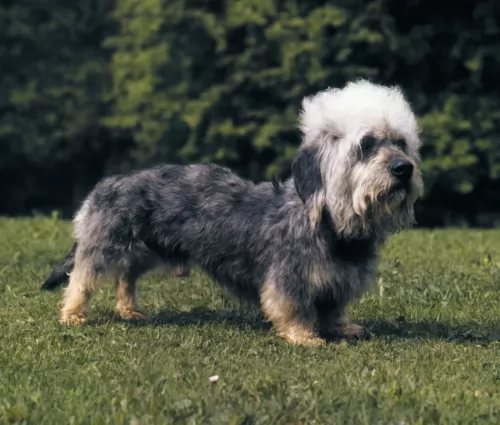 Your Dandie Dinmont is capable of being a wonderful companion. He loves spending time with his human family and is affectionate and loyal.
Your Dandie Dinmont is capable of being a wonderful companion. He loves spending time with his human family and is affectionate and loyal.
The small Dandie is able to fit into life in the city or country, just so long as he has his human family with him. Because he comes from Terrier dogs, he is no push-over though and he has an independent streak which will benefit from training and socialization.
Make sure you give this small dog of yours plenty of love and good care and you will find that you have a loyal, devoted friend in him.
 The Maltese is a popular dog no doubt, and his smallness is a draw-card as he adapts easily to life in the city or the countryside.
The Maltese is a popular dog no doubt, and his smallness is a draw-card as he adapts easily to life in the city or the countryside.
He is loving, loyal, intelligent and responsive, making him a good family dog and being an excellent playmate for children. Teach your children how to respect animals because raucous, disrespectful kids might produce a nip from an agitated Maltese.
Being a light shedder is another draw-card, with him being looked upon as a hypoallergenic breed. He has got so many good things going for him that he is guaranteed to make you an ideal pet.
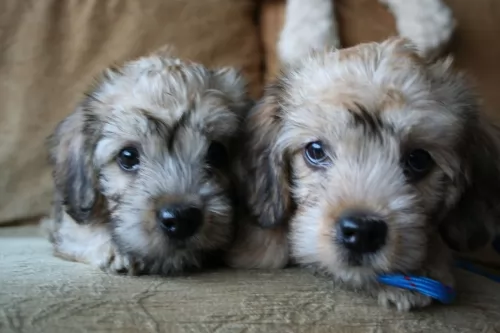 Your pet Dandie Dinmont is a robust little dog who, with good care, can live to be anything between 12 to 15 years of age.
Your pet Dandie Dinmont is a robust little dog who, with good care, can live to be anything between 12 to 15 years of age.
With every dog breed there will be health concerns, and these can include illnesses such as epilepsy as well as hypochondroplasia. All dogs have the potential to fall prey to health problems, and getting your pet from a reputable breeder can help to ensure you eliminate some of these diseases.
This small dog has a long body which means he can be affected by spinal problems. Genetics and body shape play a large role. Intervertebral disc disease is a condition where the cushioning discs between the vertebrae of the spinal column herniate into the spinal cord space. The discs press on the nerves and pain and paralysis can follow.
 Your Maltese is a feisty little thing who, with good care, can live for a good few years – up to 15 or even longer. As with any other dog, he can become ill. One or two illnesses to look out for include -
Your Maltese is a feisty little thing who, with good care, can live for a good few years – up to 15 or even longer. As with any other dog, he can become ill. One or two illnesses to look out for include -
Sebaceous adenitis is caused by inflammation of the sebaceous glands and is an uncommon skin disease found in some breeds of dog.
There are two types - one for long coated breeds and one for short coated breeds. For long or double-coated dogs, you’ll notice a white/silvery kind of dandruff on the coat as well as hair loss. There can also be skin lesions along the back and ears. It can make your pet miserable and he will need to see a vet.
A common hormonal problem is canine hypothyroidism, brought on by inadequate levels of thyroid hormones. Symptoms include hair loss, weight gain, coldness and a weakened immune system.
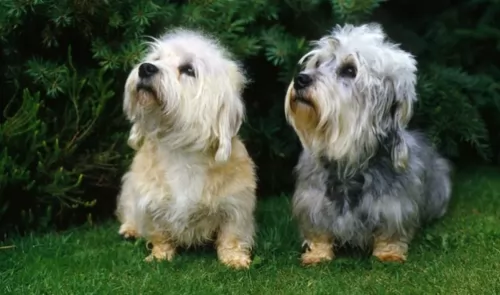 The Dandie doesn’t require as much exercise as some other dog breeds but you want to make sure he goes with you on your walks, or you play ball with him in the garden. You don’t want to see a small dog like this becoming obese as it can herald in a host of health problems.
The Dandie doesn’t require as much exercise as some other dog breeds but you want to make sure he goes with you on your walks, or you play ball with him in the garden. You don’t want to see a small dog like this becoming obese as it can herald in a host of health problems.
The Dandie Dinmont Terrier doesn’t shed a hang of a lot but still, you will need to brush him twice a week to get rid of those loose hairs. Also, the coat will require stripping twice a year. Some dog owners who prefer a low maintenance breed might not like knowing this, but it is a necessary part of his grooming. There are some dog owners who cut the hair rather, but then the texture of the coat will change. This is only important to know if you want to show your Dandie. Other Dandie owners take their pets to a professional groomer for clipping.
Because the Dandie has floppy ears and a lot of hair around the face and ears, you will need to check his ears for dirt and wax build-up as these can cause an ear infection. If you’re nervous to be going inside your dog’s ears, the vet or the dog groomer can show you how.
Also, little dogs like this are prone to tooth decay, and you will need to brush his teeth 2 or 3 times a week. This is because plaque and tartar buildup can cause mouth infections which contribute to other diseases within the body.
 Your Maltese is going to require quality food, water, exercise and shelter to enjoy a good life. The type of food you feed any dog has a direct impact on his health.
Your Maltese is going to require quality food, water, exercise and shelter to enjoy a good life. The type of food you feed any dog has a direct impact on his health.
You need to provide him with quality food, and if its commercially manufactured food, you need to read the labels carefully so that the food is appropriate to your Maltese. For instance, you can’t mistakenly pull a ‘large-breed’ packet of food off the shelves and expect your Maltese to be able to stomach it.
If you do buy him this kibble, make sure the ingredients are wholesome. To break the monotony of eating kibble every day, give him some boiled chicken, brown rice and some raw or cooked vegetables chopped up finely into his kibble. He will love you for this as it makes a tasty meal for him and will keep him healthy.
Try to keep his diet nice and simple to avoid digestive problems.
Make sure he has constant access to fresh, cool water.
Make sure your Maltese dog has a nice warm, dry place to sleep.
Get him to the vet if you notice that he is ill.
Brush his hair twice a week and take him to have it professionally cut if you prefer.
Clip his nails when they become too long and check around his eyes and inside his ears for any kind of infection.
These little dogs are prone to dental problems and he will need to have his teeth brushed 2 or 3 times a week.